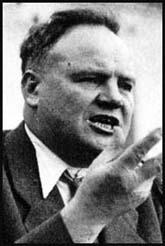Maurice Thorez

Maurice Thorez was born at Noyelles-Godault, France, on 28th April, 1900. Born into poverty he became a coal miner at the age of 12.
In 1919 he joined the Socialist Party but after a year he transferred his allegiances to the Communist Party. Imprisoned several times for his political beliefs, he eventually became secretary general of the party in 1930.
Thorez was elected to the Chamber of Deputies in 1932. Concerned by the emergence of Adolf Hitler in Nazi Germany, Thorez joined with Leon Blum, Edouard Daladier, Edouard Herriot, Daniel Mayer and other left-wing political figures to form the Popular Front. Parties involved in the agreement included the Communist Party, the Socialist Party and the Radical Socialists.
The parties involved in the Popular Front did well in the 1936 parliamentary elections and won a total of 376 seats. Leon Blum, leader of the Socialist Party, now become prime minister of France. Once in power the Popular Front government introduced the 40 hour week and other social reforms. It also nationalized the Bank of France and the armaments industry.
After the signing of the Nazi-Soviet Pact in July, 1939, the Communist Party was banned by the French government. Thorez now went to live in the Soviet Union and left Jacques Duclos, to become leader of the underground party in France.
When France was liberated in the summer of 1944 the country's new leader, General Charles De Gaulle, acknowledged the important role played by communists by permitting Thorez to return from the Soviet Union.
In the 1945 elections the Communist Party became the strongest political group in France with 25 per cent of the vote. The party now joined forces with the Socialist Party to form a government and Thorez became deputy prime minister (1946-47).
Books by Thorez included Son of the People (1937) and Politics of French Greatness (1945). In later life his health deteriorated and by 1950 he had began to suffer from a paralytic illness. He remained party chairman until shortly before his death on 11th July, 1964.
